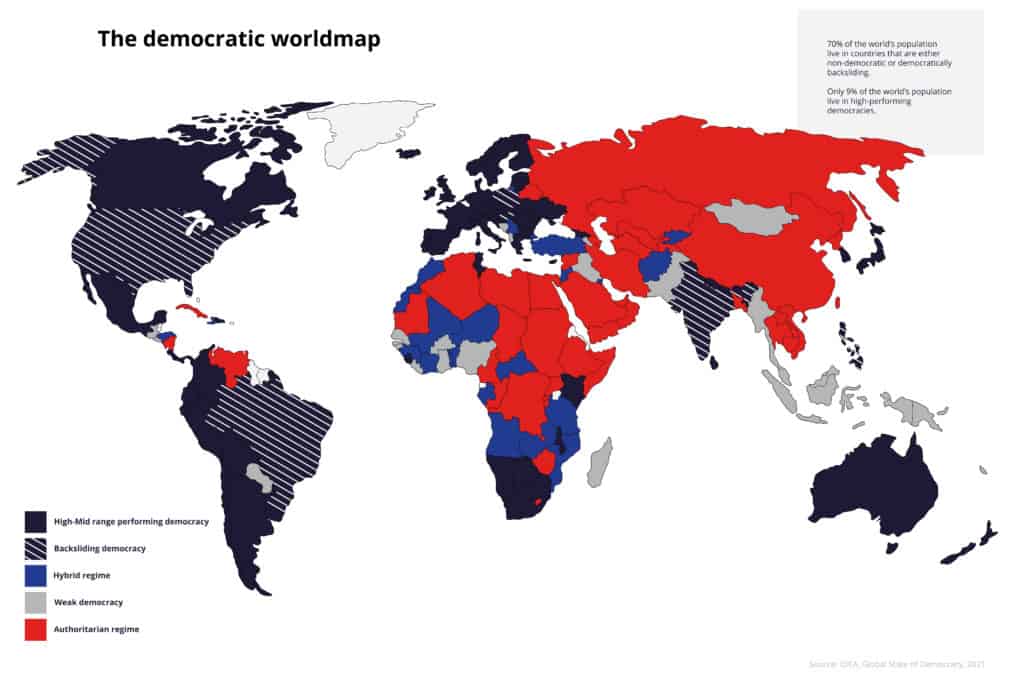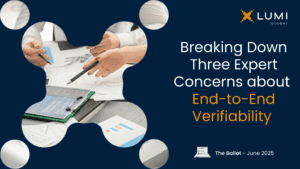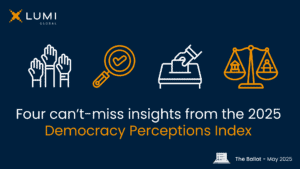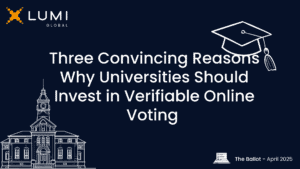Recent months have reminded us of how valuable a well-established democracy is, both as a civilized arena for electing and dismissing those in power and as a fence against violations of the rules of law. Current events also remind us that democracy is fragile, and we must never take it for granted or, as the famous Danish democratic theorist Hal Koch once put it: “Democracy is not a victory that has been won. It is a constant battle.”
In this context, it is alarming that 2021 was a year, where the number of countries moving in an authoritarian direction outnumbered those going in a democratic direction. Even democratically elected governments, including established democracies, are increasingly adopting authoritarian tactics in governance while still enjoying popular support (“The Global State of Democracy 2021” p. 1, IDEA.int).

The challenge of reversing democratic backslide is deepened further by a general decline in turnout in democratic elections in national and member-based organisations. A sustainable democratic culture is dependent on frequently touch points for citizens and members. Ignoring the general decline in democratic participation is a huge mistake with potentially irreversible negative consequences for our democratic future.
Democracy needs to be learned, practiced, and treasured if we are to ensure a resilient democratic culture, and we are all have a role to play. Breaking the word “democracy” down to its roots, we are all a part of “Demos” (the people), and therefore all responsible for creating a “Kratia” (the government) that is both based on basic democratic principles and in sync with our modern way of life.
There are many ways to approach this urgent task. We have summarized some of our important learnings and recommendations from 20+ years of developing and operating digital election services for all types of public and private democratic organizations.
Democracy is a skill that needs to be learned and practised
A first important step is to ensure a broad aspiration for the democratic idea. We need to be introduced to democratic arenas from an early age and learn how to act as a democratic citizen. We need to learn the code of conduct in democratic debates, how to conduct free and fair elections, how to represent and how to be represented, etc. In short, we need to learn and practise democracy if we are to become active democratic citizens. Schools and educational institutions have a significant role in this context, but so do the broader functions of a civil society. Local communities, non-governmental organizations, democratic associations, political parties, and the like all play a significant role in creating a viable democratic culture. Research has shown that adopting to a democratic behaviour in the formative years is crucial for a life-long democratic mindset. Hence, a democratic investment is urgently needed to ensure future democratic minded generations.
Contemporary democratic formats and participation
A second important step is to adapt ways of democratic participation to a contemporary way of living in the 21st century. Traditional, place-bound democratic participation is simply inadequate to create sufficient awareness, engagement, and accessibility. “Democracy” needs to be present where people interact with each other and live their public life if we are to reverse the backslide. We must overcome technical obstacles to gain momentum and ensure the integrity and security of online democratic activities. The risk of not using the internet to increase democratic participation by far exceeds the risk to democracy posed by maintaining status quo in places where democratic participation is declining rapidly. Every moment we spend waiting to do what is needed is time when other forces can take advantage of our online democratic absence. Undemocratic actors can manipulate the situation by imposing echo-chambers, fake news, and access restrictions making it even more difficult to reverse the general decline in democratic participation.
Adopting online democratic technologies will also facilitate greater equality in democratic participation for groups that are frequently excluded or highly dependent on others’ assistance to exercise their constitutional rights to cast a vote. Place-bound and paper-based elections present added challenges to people with disabilities, voters with visual impairments, expatriates, people without access to reliable transportation, and others. Unpredictable factors such as natural disasters, medical emergencies, and global pandemics can also make traditional voting methods exclusionary for many people. A resilient and proven online voting system can relieve many of those concerns and benefit democracy as a whole.
It is not too late to reverse the democratic backslide
Many organizations around the world have had positive experiences in applying new, accessible technologies to the democratic process. Those experiences range from minor adaptions to existing participation formats to radical innovations in democratic methods and processes. As these changes take hold, some universal learnings about revitalising democratic participation have emerged:
Political support. It is important that the process is supported with sufficient resources and commitment from the local political establishment. It is always difficult to change “the usual procedure”. By applying resources and political commitment, from all sides of the political spectrum, the probability of success increases significantly.
Local engagement. Revitalising democratic engagement in local communities and organizations requires an early and substantial involvement from these groups in the transformational process. That includes everything from defining the participation format(s) to the practical organisation of the processes. Once this commitment is in place, a huge barrier to success is removed.
Qualified inspiration. There is no need to risk reproducing other organizations’ failures by starting from scratch. There are many learnings from experiments around the world, that could benefit local discussions and strategies. Start your process with point of departure in inspiring use-cases.
Integrity and accessibility. It is imperative to apply accessible and secure technologies that provide provable election results. These technologies need to comply with basic democratic principles such as anonymity, voter secrecy, distributed trust, and independent audibility. Trust in the democratic process strongly depends on the use of trustworthy technology. Failing to provide sufficient technology will further deepen the democratic crisis. The good news is, that these technologies are available and have proven to be one of many valuable tools in mobilising democratic participation.
The next generation of democratic minded citizens is created today
Revitalising our democracy is one of the most urgent tasks facing humanity today. If we fail to mobilise the coming generation to take part in the democratic arena and to provide unambiguous trust in the democratic processes, we are paving the way for uncivilized battles in the streets.
We all have a responsibility to reverse the democratic backslide. If we are to succeed it will take a concentrated effort from all concerned citizens. Democratically elected politicians can put democratic participation on the agenda and allocate resources to increase democratic engagement in local communities. Board members in democratic associations and organisations can put topics on the agenda for Annual General Meetings that appeal to underrepresented groups. Schools and universities are important in promoting democratic participation in educational activities and by elected student boards. Democratic-minded parents can bring kids to democratic events and explain why the democratic arena is important to settling disputes and qualifying the decisions. Democratic participation is an object lesson for allowing all kinds of arguments to be considered – even the ones you did not know before entering the democratic arena.
We all have a role to play to make sure that the next generation picks up the democratic torch. At Assembly Voting we are working closely with our clients to ensure a successful transformation from a place-bound and paper-based democracy with low turnout, to a hybrid organised and easily accessible democracy with increased participation. Cultural and behavioural changes take time, but it is possible to start moving democratic participation in the right direction, by applying a new contemporary approach to accessible democratic formats and technologies.


